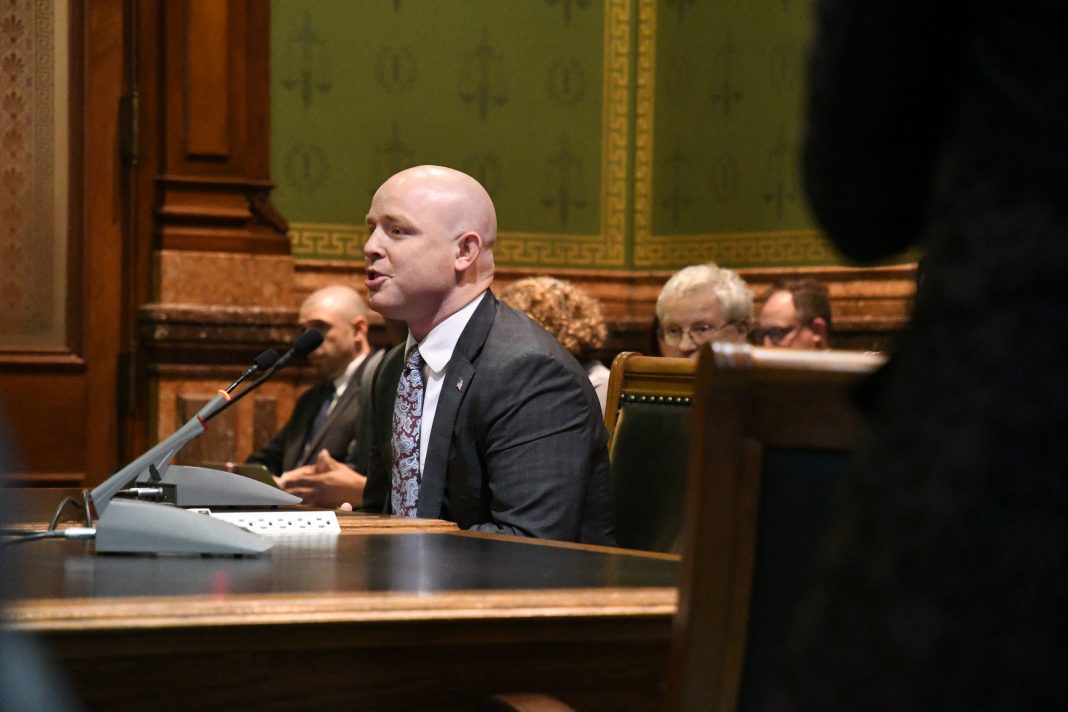An Iowa House subcommittee moved Senate File 2348 through to the full Judiciary Committee on Monday. The bill defines the terms that would fulfill the discharge of the sentence for a felon to automatically have his or her voting rights restored.
The bill would be attached to the proposed constitutional amendment should it pass. That amendment would provide automatic restoration for felons in terms of their voting rights once they are discharged of their sentence. It also would prevent any felons who committed homicide or rape from receiving automatic restoration of their voting rights.
Most speakers opposed the measure or said they were undecided due to concerns with the bill requiring restitution be paid to victims before a felon would receive automatic restoration of his or her voting rights.
“You probably wouldn’t know, but many don’t realize how large a bill they come out with,” said Brian Carter of the United Methodist Church. “You ask that they pay all of this is impossible, except over the long term.”
Carter, like many of the others who spoke in opposition to the bill, suggested allowing automatic restoration for felons if they have a payment plan set up for restitution. He said he’s concerned with holding people back from voting until they finish paying restitution.
“Voting is one of the ways that we identify as citizens,” he said. “That is one of our rights as citizens and it seems like they should be able to obtain that right as soon as they come out and as soon as they’ve paid their debt to society.”
Drew Klein with Americans For Prosperity spoke in support of the bill. He said there’s been a need to define what discharge of sentence looks like from the beginning of conversations surrounding the proposed constitutional amendment.
“I think this does a good job of carving that out and really dealing with some tough issues,” Klein said. “There’s been a lot of discussion on exactly what we should and shouldn’t include in that. I think this is a reasonable definition of what it should mean.”
Despite some concerns from others about payment of restitution to victims being considered a poll tax, Klein said Iowa lawmakers did a good job of distinguishing between the debt owed to the government or a corporation as opposed to natural persons. Which is different from Florida’s actions.
He also said it is important to note that requiring payment of restitution in order to receive automatic restoration is not moving backward.
“This is not a step backwards for anyone,” he said. “Anyone with no ability to pay restitution, it leaves in place the ability to petition the governor to have their voting rights restored. This represents a marked improvement for the citizens for whom this was really intended to be aimed at, to begin with.”
Laura Hessburg with the Iowa Coalition Against Domestic Violence testified against the bill.
“We do believe it will undermine the constitutional amendment,” she said. “We do not oppose ensuring that victims get paid restitution, we do oppose discriminating between voters based on their ability to pay. Voting shouldn’t be based on individuals’ ability to pay.”
Hessburg said the proposed constitutional amendment will not eliminate the obligation to pay restitution for anyone. She repeated the claim that opposing this bill means people are opposing victims.
“We hope this false narrative does not continue,” she said. “From a crime victim perspective, civically engaged citizens create safer communities.”
Tom Chapman of the Iowa Catholic Conference spoke against the bill. He said the group looks at the bill from the perspective of victims and people coming out of prison as well. He also wants to see a stipulation that would grant automatic restoration if someone is on a payment plan for restitution.
“Requiring all restitution could end up keeping lower-income people from voting,” he said. “Nothing you do or don’t do in this bill is going to stop offenders from having to pay restitution. In our view, returning the right to vote promotes the civic engagement.”
Chapman said it’s about mercy, dignity and justice.
Kelly Meyers with the Iowa County Attorneys Association said the group is registered undecided but supports the section of the bill that requires victim damages to be paid back before automatic restoration.
She took issue with Hessburg’s earlier assertion that sometimes you can’t tell the difference with who the victim is.
“By the time we get to the prosecution, it’s clear in the prosecutor’s mind who the victim is,” Meyers said. “There’s a subsequent conviction. So, it is clear in the system at that point who the victim is.”
Meyers said victims can’t be made whole, but the system provides a small measure of trying to account for the cost to victims.
“It’s insulting to think that that should just be wiped away and there should be no accountability for that,” Meyers said.
Greg Baker, who represents The FAMiLY Leader Foundation, said the group is undecided on the bill, but in favor of the constitutional amendment as a whole. He said they agree with most of the bill, but question the area of restitution.
“I don’t envy your position,” Baker said. “Defining discharge of sentence is not easy. There’s a delicate balance between justice and mercy that you all are charged to find. I think this bill is moving in the correct direction for that.”
However, Baker said, the time has been served.
“There has to be a point where you allow a person to move on and become a part of society again,” he said.
Baker said often there’s a second-class citizen feeling for felons or people who were formerly in prison. It largely keeps people in the system long after they’ve served their time, he added.
At times restitution could get so high it would take a lifetime to pay off.
“The idea of a payment plan, because in reality, if individuals do not get back into society and do not move past their identity being a prisoner, they’re never going to pay back a dime of that restitution and too many people end up back in prison,” Baker said.
Daniel Zeno of the ACLU spoke against the bill. He said the organization opposes any bill that limits voting rights.
“We think democracy is stronger when more people can vote and not when fewer people can vote,” Zeno said.
Zeno agreed that making sure the restitution is fully paid back to natural persons and not a corporation or a business was a good move.
“That being said, we think the bill in whole does more harm than good,” he said.
Former state representative Clel Baudler spoke at the subcommittee on the bill. He was the lone person in the room to speak in opposition to providing automatic restoration at all.
“I have a pretty hard-nosed opinion about it,” he said. “Being a citizen with your rights should not be easy, never has been. What are you trying to fix? All you gotta do is do a one-page form that you get from the Governor’s office and the governor can give you your right to vote back.”
Baudler said earlier this year he saw Reynolds gave more than 400 people permission to vote.
“You have to be very careful of what’s coming after this,” Baudler said. “I oppose the whole notion that felons should automatically be given something once they get out of prison. When you go in prison in Iowa as a felon, you’ve got a whole list of history in the background. I’m very much opposed to the constitutional amendment and what the Senate did the other day in restoration. I just hope you walk away from both of them. Not walk away, run away.”
Rep. Mary Wolfe (D-Clinton) said she fully supports the constitutional amendment, which she said passed the House unanimously last year. The bill did not pass unanimously last year, both Dean Fisher and Jon Jacobsen (Republicans), voted against the measure.
Wolfe said she is disappointed the Senate effectively held the amendment “hostage.” As for this bill, Wolfe said it could be worse.
“On this one, I’m going to stand with the Catholic church and the ACLU and say I have serious concerns about requiring full payment of restitution before restoration of rights,” Wolfe said. “If you have two felons who committed the same crime, who come out of prison having discharged their sentence, owing the same amount of restitution and one is able to pay and the other isn’t because he or she sincerely has no financial means other than working at a minimum wage job and cannot write a check for $3,000, 4,000 or $5,000, the way the other person can, I do not see any justice in requiring that person to wait months or even years in order to have his rights restored.”
Wolfe said she doubts there is evidence to suggest withholding the right to vote until restitution is paid creates an incentive to pay restitution.
“I fear that all we are doing by putting that requirement in there is creating a requirement that is unconstitutional on its face,” she said.
Rep. Steve Holt (R-Dension) disagreed with Wolfe’s assertion that the Senate is holding the amendment hostage. He said the Senate is simply doing its due diligence and addressing a lot of the concerns House Republicans had last year.
While some pointed out Iowa is the last state to provide automatic restoration of voting rights to felons, Holt said he doesn’t have a problem with that.
He supports second chances, he said, but doesn’t want victims to be forgotten.
“Behind every felony, there is a victim,” Holt said. “We also need to be thinking about victims in this situation. So, I would, and most of my caucus would not have supported this the second go-around had we not clarified that murderers and rapists would not automatically get their right to vote back.
“You can never make it whole when you’ve murdered someone. Their life is gone forever. And you can never make it whole when you’ve raped someone. I have no problem with victim restitution. If you don’t like the time, don’t do the crime. If you don’t like to repay victims, don’t do the crime.”
Holt said there’s a reason that just about every state in the country did not allow felons to vote at one time.
He said the country has moved in a different direction. This bill is the only way the proposed amendment will get through the Senate, Holt said.
Rep. Bobby Kaufmann (R-Wilton) also spoke in support of the legislation.
“There were a few comments that were made — one about the complete shock that prisoners have when they get out of jail at the size of the bill that they’ve got to pay back,” Kaufmann said. “I couldn’t possibly care any less about that shock because they incurred that debt by hurting someone. So that argument means nothing to me.”
Kaufmann also said Florida’s law is different than the proposed amendment and bill in Iowa. He said requiring restitution be paid to the government or a business could be considered a poll tax, but in his opinion, requiring restitution be paid to victims is not.
And, he added, if someone owes an amount they can’t pay, they can still do the exact same thing they’re doing today and petition the governor for restoration.
“I have no interest in changes and the way that I’m selling this is, you do not get to be made whole,” Kaufmann said. “Your rights as a person who committed a crime do not get to be made whole until the debt that you owe to someone who you hurt is made whole.”












